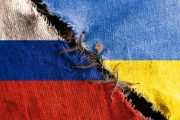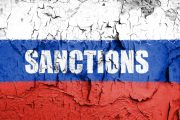Speaking at a ceremony held in Gdansk, Poland, at the exact location and exactly 70 years to the day, hour, and minute after a German battleship fired the first shots of World War II, Polish President Lech Kaczynski laid blame for the onset of the war at the feet of both the Soviet Union and Nazi Germany.
The celebrants recalled that historic moment at 4:42 am on September 1, 1939, when the German battleship Schleswig-Holstein opened fire on a Polish military garrison on the Westerplatte peninsula of the Free City of Danzig — as Gdansk was then called.
Many Western historians of the "liberal" persuasion are inclined to blame Germany almost entirely for the start of the war (exonerating the Soviets retroactively after the mercurial Hitler broke his alliance with them and attacked them). However, President Kaczynski knows his history too well to let Hitler’s co-partner in aggression off the hook so easily.
Kaczynski knows, for instance, that Soviet foreign minister Vyacheslav Molotov and German foreign minister Joachim von Ribbentrop signed the Molotov-Ribbentrop pact between the two totalitarian governments on August 24, 1939, just a week before the German attack on Poland. The document was not only a non-aggression pact and pledge of neutrality, but included a secret protocol dividing the nations of Northern and Eastern Europe into German and Soviet spheres of influence, in anticipation of expected "territorial and political rearrangements" of that region.
Following the naval bombardment at Gdansk, German forces invaded Poland from the north, south, and west. The ground invasion was supported by the Luftwaffe, which was assisted by the Soviets, who allowed German pilots to navigtate by using signals broadcast by the Soviet radio station at Minsk allegedly "for urgent aeronautical experiments." On September 17, the Soviet Army invaded eastern Poland, which was a violation of the 1932 Soviet-Polish Non-Aggression Pact. Soviet troops occupied the Polish territory designated by the Molotov-Ribbentrop Pact.
By October 6, 1939, Germany and the Soviet Union had occupied all of Poland.
It was with this historical knowledge that Kaczynski, speaking at the dawn ceremony, noted the 1939 Soviet invasion of Poland: "On 17 September… Poland received a stab in the back… This blow came from Bolshevik Russia."
BBC reported that later in the day, Kaczynski, while attending a wreath-laying ceremony, again criticized the Soviet role in the war, and also recalled the tragic occupation Poland endured under the Nazis following its military defeat.
The Polish president also recalled the Katyn massacre of 1940, in which 20,000 Polish officers were killed by Soviet secret services, calling the massacre an act of chauvinism performed in revenge for Polish independence.
Following Kaczynski, Russian Prime Minister Vladimir Putin delivered a speech in which he said that all pacts between European states and Nazi Germany were "morally unacceptable," including Molotov-Ribbentrop.
"All attempts to appease the Nazis between 1934 and 1939 through various agreements and pacts were morally unacceptable and politically senseless, harmful and dangerous," said Putin, offering a watered-down explanation for the Soviets’ partnership in the pact. "We must admit these mistakes. Our country has done this."
German Chancellor Angela Merkel also spoke at the ceremony, noting the "immeasurable suffering" that began with Germany’s invasion of Poland:
"No country suffered from German occupation as much as Poland. Here at the Westerplatte, as German chancellor, I commemorate all the Poles who suffered unspeakably from the crimes of the German occupying forces."
In a conference held with his counterpart , Polish Prime Minister Donald Tusk on September 1, Russia’s Putin reverted to a state of denial by denying the Soviet Union’s joint responsibility for bringing on the war, stating: "In Russia, we see constant, persistent attempts to make it seem that World War Two was made possible solely by the Molotov-Ribbentrop pact. Why throw these false facts into the public consciousness and then speculate on them in domestic politics? This is the worst thing we could do."
Tusk, however, stuck to his understanding of what actually transpired:
"The truth can be painful, but it should not humiliate anybody… If prime minister Putin’s declaration means that for Russia, seeking the truth about those events is not a humiliation but a thought-out, wise strategy to reach an understanding for the future, then we are happy.
"Two totalitarian states decided the fate of this war, first as allies, then as enemies," Tusk said, referring to Hitler’s eventual decision to attack his former partners in crime.
"We cannot forget how much blood Soviet troops left on our soil. Nothing which happened after 1945 can change this."
The Middle East-based Al Jazeera network reported that Sergei Lavrov, Russia’s foreign minister, reacted with anger and indignation to an article published in the Russian state newspaper Rossiiskaya Gazeta on September 1 that rather accurately noted the similarities between German Nazism and Soviet communism.
"Even during the Cold War no-one ever tried to put the Nazi regime on one level with the Stalin dictatorship," said Lavrov. "It never occurred to anyone to equate the Nazi threat, which meant the annihilation of whole peoples, and the politics of the Soviet Union, which was the only force able to resist the war machine of Hitler’s Germany."
Lavrov’s strong defense of the Stalin regime’s reputation suggests that there are still influential persons within the Russian government that have more affection for the ways of the old communist regime than for modern Russia’s supposed post-communist capitalism.
An article in the British Times online for September 1 cut right through Vladimir Putin’s staged propaganda fest during the World War II commemoration ceremonies. Referring to Putin’s platitudes that "Russia has always respected the bravery and heroism of the Polish people, soldiers and officers who stood up first against Nazism in 1939" and his repudiation of Soviet cooperation with Nazi Germany as "morally unacceptable and politically and practically senseless, harmful and dangerous," the Times writer observed:
He may have convinced some of the other politicians present, but not the Poles. The praise of Polish military bravery struck a cynical note: in 1940, more than 15,000 officers and intellectuals were shot and buried in mass graves in Katyn forest by Soviet units. For decades Moscow claimed it was the work of the Germans and even now refuses to accept that it was a war crime. Joint teams of historians will now study the massacre, according to an agreement reached between the Polish and Russian prime ministers.
As for Mr Putin’s cautious admission that the 1939 pact between the Soviet Union and Nazi Germany was morally unacceptable, that was somewhat diluted by his reference to 1934 – the year of Poland’s non-aggression pact with Germany. In effect, he was drawing a moral equivalence between the defensive Polish action and the landgrab of eastern Poland by Stalin five years later. And that many European countries, not just the one led by Stalin, helped Hitler on to the war path.
The Poles had hoped for candour from Russia on this day of all days; instead they got historical relativism. "Huge numbers of mistakes were made by all sides," said Mr Putin. Was that the beginning of an apology for carving up Poland in 1939? Or just an attempt to deflect criticism from the Baltic states and the Finns who were deported to the gulag when the Red Army moved in?
A report in the New York Times noted the widespread recognition among Poles of the Soviet Unioni’s role in invading their nation and initiating the world war:
Many in Poland are angered by what they see as Russia’s failure to acknowledge atrocities committed by the Soviet Union — including the massacre of Polish soldiers in the Katyn Forest and mass deportations — after its troops occupied eastern Poland just weeks after the Nazis invaded the west of the country.
"They split Poland in two parts," Andrzej Halicki, chairman of the Polish Parliament’s Foreign Affairs Committee, said by telephone. "We were under occupation by Russians and by Germans."
Of course, unlike the German occupation, which ended with Germany’s defeat in May 1945, the Soviet occupation of Poland continued long after the war. Winston Churchill observed on the eve of the infamous Yalta conference that consigned much of Eastern Europe to Soviet hegemony: "Romania and Bulgaria have passed into the grip of Soviet military occupation, Hungary and Yugoslavia lay in the shadow of the battlefield, and Poland, though liberated from the Germans, has merely exchanged one conqueror for another."
Soviet troops and their puppets that had forcibly been installed in positions of power in Poland would dominate Poland until the 1980s, when the Solidarity movement was widely credited with initiating the throwing off of the yoke of Soviet domination.
However, while negotiations for creating a new political system were progressing in 1989, the March 2, 1989 issue of the Soviet current affairs weekly New Times printed an interview with Solidarity leader Lech Walesa in which he acknowledged that he was not seeking to take power away from the communists. "Let power remain in the hands of the communists," he said, "but let it be different. Let it serve the people better, respect the law and be accountable to society. We are prepared to cooperate constructively with such authorities."
It is to be hoped that the historic sense of cynicism that Polish leaders seem to retain regarding Soviet communists of the Stalin era will extend to the many Polish "former" communists that have remained on under Poland’s post-Solidarity governments.
Photo of President Lech Kaczynski: AP Images




